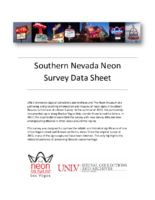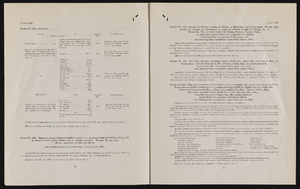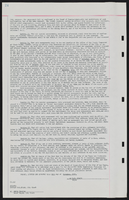Search the Special Collections and Archives Portal
Search Results

Mariteresa Rivera-Rogers oral history interview: transcript
Date
Archival Collection
Description
Oral history interview with Mariteresa Rivera-Rogers conducted by Maribel Estrada Calderón on October 24, 2018 for the Latinx Voices of Southern Nevada Oral History Project. In this interview, Mariteresa discusses her early life in Concepción, Chile. She talks about her experience moving to Las Vegas, Nevada in 1965, the immigration process at the time, and becoming a Spanish language court interpreter. Rivera-Rogers recalls enrolling at the University of Nevada, Las Vegas' (UNLV) Sam Boyd School of Law, and her involvement with the Latino Bar Association. Lastly, Rivera-Rodgers discusses the challenges in translating Spanish language to English.
Text

Transcript of interview with Lyn Robinson by Barbara Tabach, September 18, 2014
Date
Archival Collection
Description
One day in 2012, UNLV student Lyn Robinson spied a posting on the bulletin board for a photographer for the Sperling Kronberg Mack Holocaust Resource Center. She was an art major with a concentration on photography. She was also had a deep appreciation of the horror of the Holocaust and what the survivors she would take photos of had endured. Thus began a two year project, during which she took photos of over sixty survivors. Her images are preserved at UNLV Special Collections & Archives. Prints are displayed at the Sperling Kronberg Mack Holocaust Resource Center. On September 18, 2014, Lyn shared her work for this oral history recording. She is a native of Florida, daughter of a horticulturist father and pianist mother.
Text

Blue Angel Motel Neon Survey document, August 12, 2017
Date
Archival Collection
Description
Site address: 2110 Fremont St
Sign owner: Bartsas Mary 22 LLC
Sign details: Motel was originally constructed c. 1956. Sits on a 2.54 acre site. Property was later changed to Club 2110, but now is vacant.
Sign condition: Unknown - Angel is being repaired by City Centennial Commision and YESCO, and will believed to be placed on medium of Fremont and Charleston once restored. 4 - Arches were repainted at unknown time from original blue to a deep forest green, "Blue Angel" was removed and "Night Club" was put up in blue angels place. "Motel" wording on flag portions of the sign was painted over and replaced with "Club 2110". doesn't have any form of lighting, appears to be in decent condition.
Sign form: Angel - Sculpted Pole Sign/ Monument Sign, Arches: Pole sign with protruding arches on either side. Originally the left side arch would have rested on the Blue Angel motel building, but when it was torn down so was the connection, so it is free hanging off the pole support system.
Sign-specific description: Angel: Pole sign with sculpture of Angel on top. Was internally illuminated, her skin, hair, halow, pole, wand, used to illuminate. Two flag signs hung off of angel pedestal, one read "Motel" other would read "Blue Angel" on opposite sides of the pole. Would of glowed with blue neon. Arches: Repainted by new owner: Arcs protruding on either side of the pole with the words "Night" and "Club" on each other arches. There are flag like components going down the pole support with stars on the opposite side of each component. Slight directional tool of the flags that point downwards to the ground. The stars do not have any lighting system of their own (no neon or bulbs). Each flag component is double sided with painted on graphics.
Sign - type of display: Neon, and internally illuminated plastic
Sign - media: Steel, fiberglass
Sign animation: Possible rotation of the angel?
Sign environment: The property is surrounded by other motels, shopping centers and gas stations
Sign manufacturer: YESCO
Sign designer: Betty Willis
Sign architect of record: C. 1956
Sign - date of installation: C. 1956
Sign - date of redesign/move: Angel - 2014 repaint, 2017 refurbishment, c. 2014 repaint of arches
Sign - thematic influences: Believed that angel was modeled after Marilyn Monroe
Sign - artistic significance: 1950s pop culture themes - Marilyn Monroe and Disney-esque angel
Survey - research locations: Motel site, www.roadarch.com, UNLV photo collections, assessor's website
Surveyor: Danny Jacobs
Survey - date completed: 2017-08-12
Sign keywords: Sculptural; Neon; Steel; Fiberglass; Pole sign; Internally illuminated; Incandescent
Text

Neonopolis Neon Survey document, September 8, 2017
Date
Archival Collection
Description
Site address: 450 Fremont St
Sign owner: Rohit Joshi leases the building from Wirrulla USA Inc.
Sign details: This building was originally constructed in 2001 as a retail store center. This location currently holds a Denny's, a vintage toy store, the Telemundo station office and an international food market. This location also held a movie theater until 2009.
Sign condition: 4.5- Sign still in relatively new looking condition
Sign form: Entrance sign
Sign-specific description: Above the main entrance way into the mall there are the letter "NEONOPOLIS" in plastic back lit signs. Each letter has a lime green border with white strip and then purple for the main color of the block letters. The letter "O" in "polis" is actually an orbit shape that is orange and purple to double as the "O". Portions of the building have neon tubes, some illuminating blue and others are purple, green, red and yellow. There are also different colored shapes of neon spread throughout the building such as yellow triangle as well as orbits showcasing red and yellow neon tubing. Many of the companies in this location have their own signs as well.
Sign - type of display: Plastic back lit sign and neon
Sign - media: Plastic and steel
Sign - non-neon treatments: Plastic back lit portion
Sign environment: This property is on Fremont in between 4th St. and Las Vegas Blvd. Right in front on the building is the Slotzilla machine where people get onto the zipline.
Sign - date of installation: 2002
Sign - date of redesign/move: When the movie theater portion of this location closed in 2009 part of the signage was taken down and in recent years with different companies settling in there have added their own signs.
Sign - thematic influences: The name and the theme of this location being neonopolis showcases the downtown neon vibe particularly since there is a wide variety of neon display surrounding this property.
Sign - artistic significance: Showcasing the different designs with neon shows how true of an art it still is, particularly with the triangle designs and the orbits
Survey - research locations: Asessors page, https://neonjoshiassociate.wixsite.com/mysite-1 Neonopolis website, https://www.reviewjournal.com/entertainment/food/neonopolis-theaters-to-go-dark-thursday-night/ Review Journal article discussing the closure of their movie theater, https://lasvegassun.com/news/2002/may/03/long-awaited-neonopolis-opens-in-downtown-vegas/ Las Vegas Sun article talking about their opening in 2002
Survey - research notes: There used to be an 18 theater movie theater located there which shut down in 2009 and was renovated into clubs, the most recent one to open is called the Nerd.
Surveyor: Emily Fellmer
Survey - date completed: 2017-09-08
Sign keywords: Plastic; Backlit; Neon; Steel; Fascia
Text

Simon Lamsal oral history interview: transcript
Date
Archival Collection
Description
Oral history interview with Simon Lamsal conducted by Jerwin Tiu, Cecilia Winchell, and Stefani Evans on December 16, 2022 for Reflections: the Las Vegas Asian American and Pacific Islander Oral History Project. In this interview, Lamsal describes growing up in Kathmandu, Nepal, and growing up with his grandparents. After graduating in Nepal, Lamsal applied to college in the United States and started in Arkansas studying computer science but later relocated to Las Vegas, Nevada and continuted at the University of Nevada, Las Vegas (UNLV). Lamsal describes joining CSUN, the National Millenial Community, and investing in his community. Currently, he is in graduate school and an information technology intern at MGM. Thoroughout the interview, Lamsal touches on a number of other topics regarding finding community, cultural foods, and family life.
Text

Transcript of interview with Catherine Hunt by Dennis Hunt, March 2, 1980
Date
Archival Collection
Description
On March 2, 1980, Dennis Hunt interviewed his mother, Catherine Hunt (born August 25, 1932 in Palmyra, Missouri) about her life in Southern Nevada. The two discuss Catherine Hunt’s work as a secretary before becoming a housewife. The interview concludes with Catherine Hunt’s thoughts on population growth, women’s rights, and the Equal Rights Amendment.
Text

Transcript of interview with Phyllis Webb Clark by Lorna Suzette Clark, April 7, 1976
Date
Archival Collection
Description
On April 7, 1976, Lorna Suzette Clark interviewed her mother-in-law, Phyllis Webb Clark (born 1928 in Los Angeles, California) about her experiences from living in Las Vegas. The two first discuss education, the various address at which Phyllis lived, and the early development of the Strip and Downtown areas. The interview then covers the visits of important individuals, forms of transportation, the effect of World War II on the economy, and the effects of the growing town on hospitality and courteousness. Phyllis also mentions the Helldorado Parade, her involvement in Boy Scouts and Girl Scouts, and recreational activities. The interview concludes with a discussion on the atomic testing, the Stewart Ranch, and floods in Las Vegas.
Text

Transcript of interview with Sam Earl by Laura Button, March 9, 1981
Date
Archival Collection
Description
On March 9, 1981, Laura Button interviewed Sam Earl (born 1912 in Virgin, Utah) about his life in Nevada. Also present during the interview is Sam’s wife, Melissa Earl. The three discuss a wide range of topics from the early development of Las Vegas, Sam’s work on the Boulder Dam, the Earls’ early residence in a tent, and the family’s religious participation. The interview also covers gambling, Block 16, the first members of the police force, recreational activities, and the Helldorado parade. Sam also talks about his work as a building contractor, including some of the buildings and casino properties he helped build, and the interview moves to a discussion of the development of the Las Vegas Strip. The interview concludes with Sam’s description of his work as a truck driver and a discussion on welfare benefits.
Text


